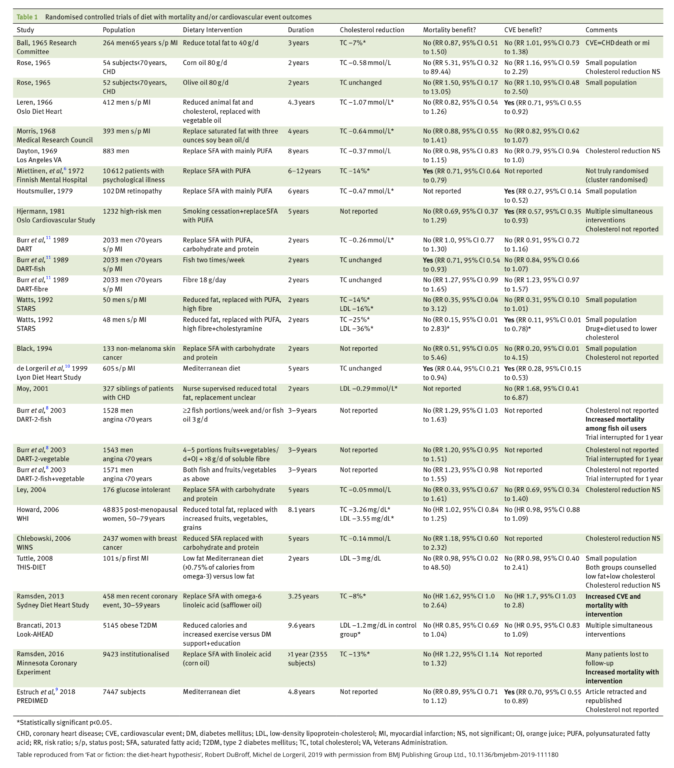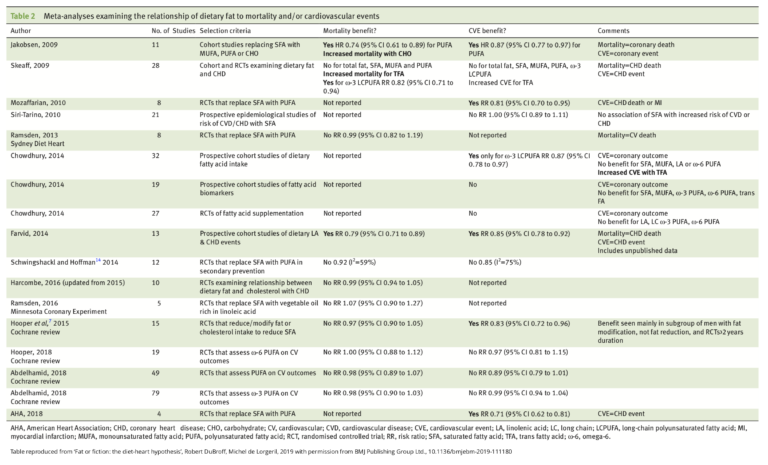In this brief 2019 review, Robert DuBroff and Michel de Lorgeril argue existing evidence fails to support the diet-heart hypothesis — that is, the hypothesis that saturated fat increases cholesterol and, in the process, heart disease risk. If the diet-heart hypothesis were true, reducing saturated fat intake would lower cholesterol and reduce heart disease risk and mortality. However, DuBroff and de Lorgeril find the majority of the available evidence ultimately fails to support the hypothesis.
Dating back to 1965, the DuBroff and de Lorgeril identified 28 randomized controlled trials testing the impact of saturated fat reduction on cardiovascular outcomes and/or mortality. These trials are summarized in the table below. In brief:
- Three trials (Lyon Diet Heart Study, 1999; DART-fish, 1989; Finnish Mental Hospital, 1972) showed significant reductions in mortality with a diet lower in saturated fat. However, the Finnish Mental Hospital study has been criticized for using cluster randomization, and the other two trials both used dietary interventions that may have reduced mortality for reasons unrelated to saturated fat (a Mediterranean diet and increased fish intake, respectively). Twenty-one trials showed no mortality benefit, and two showed increased mortality (Two did not report impact on mortality).
- Six trials (Oslo Diet Heart Study, 1966; Houtsmuller, 1979; Oslo Cardiovascular Study, 1981; Lyon Diet Heart Study, 1999; PREDIMED, 2018) showed significant reductions in the number of cardiovascular events, while 16 showed no reduction (six did not report cardiovascular outcomes). As with the trials showing mortality benefits, most of those showing cardiovascular benefits either used an intervention more complex than simple saturated fat reduction (Lyon, PREDIMED, Oslo Cardiovascular) or a small sample size (Houtsmuller, n=102). The one trial not subject to these criticisms, the 1966 Oslo Diet Heart study, showed a reduction in cardiovascular events but no improvement in overall mortality.
Overall, the majority of the evidence fails to support the hypothesis that saturated fat reduction improves mortality or cardiovascular outcomes.

The authors also reviewed 14 meta-analyses, all published since 2009, and explored the same question. Three out of 11 papers found saturated fat reduction decreased overall mortality; one of these (Jakobsen 2009) found this reduction was only present when saturated fat was replaced with polyunsaturated fat and observed that replacing saturated fat with carbohydrate actually increased mortality. Jakobsen 2009 was also the only paper that found saturated fat restriction reduced both cardiovascular event rates and mortality, again only when saturated fat was exchanged for polyunsaturated fat.

The authors conclude that all together, the weight of the evidence indicates saturated fat restriction does not decrease mortality and certainly does not decrease mortality due to a decrease in cardiovascular events. This review thus undermines the diet-heart hypothesis.
Comments on Fat or Fiction: The Diet-Heart Hypothesis
Fat and risk of health issues were the hot topic on the shop last weekend. I was helping my cousin installing the new rack and sliders from 4WheelOnline on his truck when uncle arrive from a medical check up. Those fats really accumulate over tip of a lifetime unless you got a healthy lifestyle and exercise to burn them.
Fat or Fiction: The Diet-Heart Hypothesis
1